Drugreporter 22. april 2024: Ground-breaking development at the United Nations (UN) Commission on Narcotic Drugs (CND), written by Arild Knutsen, Association for Humane Drug Policy, Norway.
The CND was historic this year. A ground-breaking change occurred at the highest level of international drug policy, and it will have far-reaching consequences globally. An article by Arild Knutsen, leader of the Association for Humane Drug Policy, Norway.
Harm reduction, in other words, measures to prevent and reduce harm from the use of illegal drugs without drug use having to end, is now at the centre of the UN’s drug policy. The UN CND was also freed from the shackles of consensus. Here is an explanation of what happened, what the UN CND resolutions and the importance of consensus were all about.
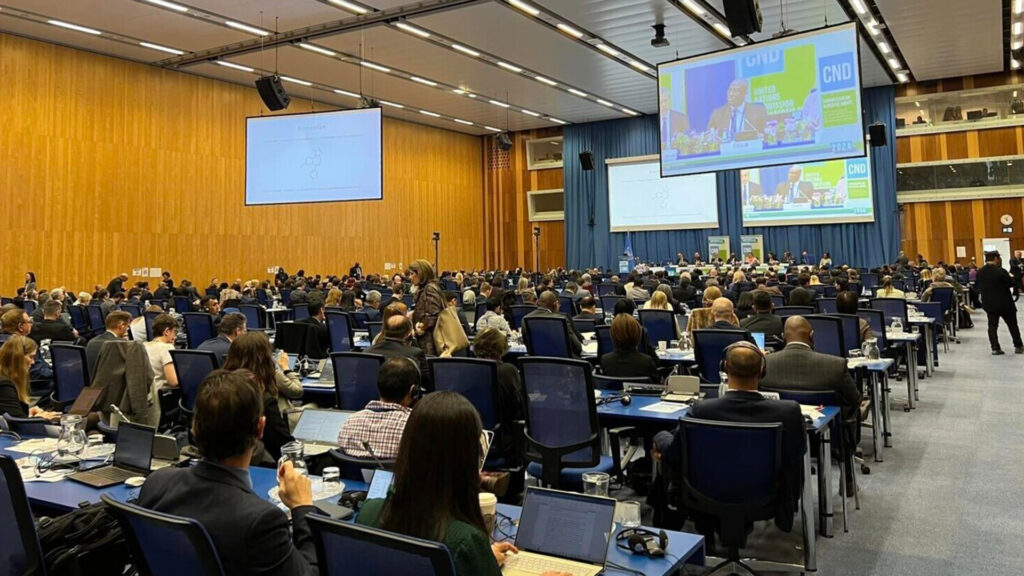
For almost 70 years, the member states of the CND have met annually and have always managed to reach an agreement on resolutions. After days of negotiation, the negotiations ended with the adoption of resolutions without a vote. During these years, it has been considered crucial for countries to reach a consensus on how they will collectively be able to tackle enormous and complicated challenges in the world with illegal drug markets. In a joint effort against organised crime and against the production, distribution and use of drugs, based on the UN Drug Conventions and the resolutions agreed upon by the UN Commission on Narcotic Drugs. Adopting a draft resolution without a vote is the basic definition of a consensus. If only one country requests a vote, a consensus has not been reached. Achieving consensus has been considered so important that if some countries have had a draft resolution but have seen, along the way, that it will not be possible to reach consensus on it, they have withdrawn the draft resolution to preserve the Vienna Spirit.
In the UN Commission on Narcotic Drugs, the attitude towards consensus is precisely called the Vienna Spirit. Resolutions are not legally binding but imply a strong influence on the countries’ authorities to implement the recommendations and priorities expressed in them. Until recently, the Vienna Spirit meant that each individual country had a kind of veto rights. Certain countries have used the need for consensus to block progressive changes in language and effort. This has contributed to a deadlock in international drug policies for decades.
As an example, it can be mentioned that the need to achieve consensus led the UN General Assembly to agree to work for a world free of drugs as late as 1998, even though many countries had long since understood that this was a meaningless utopia. This illustrates the downside of the Vienna Spirit, which has functioned as a fairly fake spirit. This year, for the first time ever, member states were unable to reach a consensus.
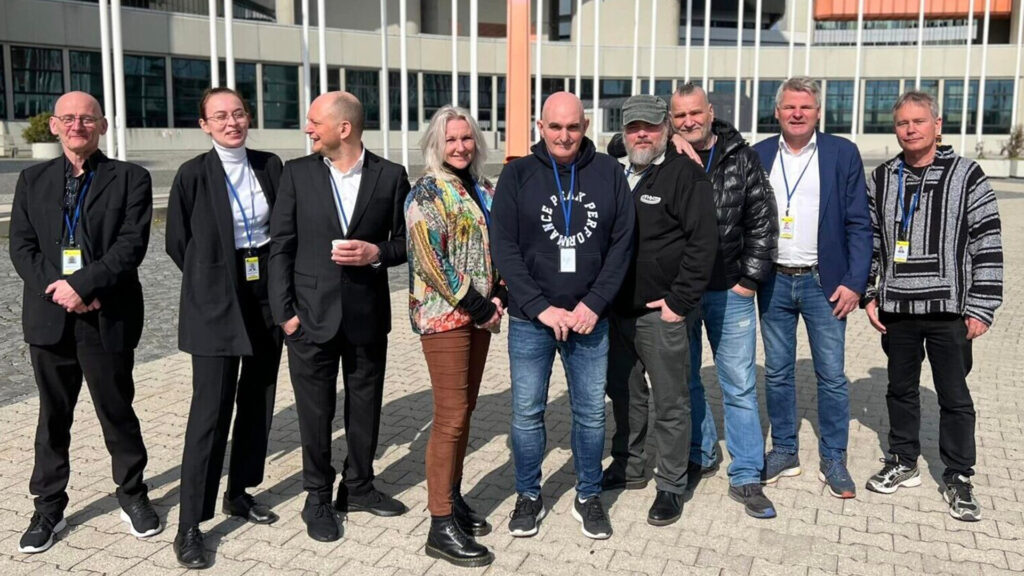
Two of this year’s four resolutions had to be voted on, and Russia and China voted against a proposal from the United States (US) for a resolution for the overdose epidemic. (The US proposed a resolution with the support of Chile, Germany, England, Australia, Belgium, Canada, Colombia, the Czech Republic, Denmark, Ghana, Guatemala, Honduras, New Zealand, Norway, Peru, Poland and Portugal). Russia and China voted against it because this resolution contained the term harm reduction, a term the US had until recently refused to accept. The draft resolution initially caused protests and led to formal negotiations between several states and informal negotiations between some of them. The negotiations lasted for over 200 hours. The term harm reduction was initially mentioned seven times and was weeded out of the text several places along the way, but in the end, it remained in one place in the resolution. Many countries supported this final draft. Other countries chose to accept it reluctantly to maintain the Vienna Spirit.
As mentioned, Russia and China voted against it, and China’s representatives explained that they accept harm reduction in that they have needle distribution and methadone treatment. However, when other countries go so far as to “‘legalise”’ drug use by creating measures such as drug consumption rooms, then it has gone too far. Therefore, China explained that they could not accept a resolution containing this term. China and Russia are not united on the issue of harm reduction; Russian authorities are strongly against needle distribution and substitution treatment.
It says something about the world situation: the countries were unable to agree for the first time in decades. At the same time, a number of countries have long since introduced harm reduction measures; some countries have decriminalised drug use; some have introduced legal regulation of cannabis; and even more are considering it. In addition, many countries are advocating a reassessment of their international control policies, and the US would probably stand with these countries rather than Russia and China, although they would probably have preferred to maintain the Vienna Spirit.
In any case, this constitutes an ever so small crack in the foundation of international drug policy. It was a powerful moment when the room erupted in applause and the US gave a victory speech after getting almost every country to vote in favour of this resolution. It was also extra heartening for us that it was precisely this part of the harm reduction flora that was to be the subject of ground-breaking development at the international level, 19 years after Norway established its first drug consumption room.
It is highly uncertain what this crack will entail in the foundation of international drug policies. First, it opened a small floodgate for further development of the policy. In the short term, this may mean that the coming years’ resolutions from CND can finally address challenges such as climate impact, indigenous peoples’ rights, the use of the death penalty, and human rights in general. It cannot be taken for granted, but there were several ground-breaking events that happened this year, which may point in that direction.
Ahead of this year’s regular CND, the UN CND held its first high-level meeting in Vienna between 14 March and 15 March. It was intended to carry out a mid-term review of the obligations set out in the Ministerial Declaration in 2019. Speeches were given by representatives of both regions and states and by leaders of UN bodies. Such as the UN Office on Drugs and Crime, the World Health Organization, UNAIDS and the UN High Commissioner for Human Rights.
All UN countries send representatives for their authorities annually. Representatives from the government attend high-level meetings, presidents, ministers and state secretaries. Until recently, the UN CND was an annual gathering where authorities from the various countries met to repeat the dogmas (undocumented claims) in their “sacred” drug conventions, where all non-scientific and non-medical use of the pagan drugs was considered both illegal and sinful. They met to brag about the number of seizures and how many actors they had taken out of the market, either by militarised means, executions or imprisonments.
There are still countries that come to CND with the same purpose, such as Russia, China, Singapore, and Iran. However, in recent years, more and more countries have advocated for placing human rights and the rights of indigenous peoples at the centre of drug policy. Drug policy organisations and drug user organisations have also started to participate, hold side events and have had good opportunities to talk to people from the delegations of the countries. This is said to have had a major impact on the changes of recent years.
Norway has observer status and is currently not a member of the UN Commission on Narcotic Drugs. This means that Norway is present with its delegation (led by Torbjørn Brekke of the Ministry of Health and Welfare). Norway supports resolutions and statements, holds side events, and participates in both formal and informal negotiations. The final results of the negotiations are adopted by countries that, at the given time, are members of the CND.
Among the highlights of this year’s high-level meeting was a statement from 62 countries, led by Colombia. (Norway is among these countries.) It calls for reform of the international drug control system and points to the disastrous consequences of the war on drugs and the importance of drug policy based on human rights. In this statement, it is pointed out that drug challenges are not only persistent but also strongly expanding and increasingly putting people’s lives, health, safety and rights at risk. In the last decade, the number of people facing drug-related challenges has increased by 45 percent globally. The supply and demand for illegal drugs have reached record highs. Simultaneously, illegal production and human trafficking contribute to a disturbing amount of violence around the world. Without that, one can trust that authorities will be able to protect people from this. In some regions, it is so bad that drug policy-related violence and crime contribute to prolonging conflict between groups. At the same time, as the spread of illegal and unregulated drugs is constantly increasing, international policies are failing to ensure legal access to regulated drugs. This causes millions to experience inhumane suffering, which could have been alleviated with medication. The 62 countries want new thinking in the international drug control system. Based on concrete knowledge, this can contribute to countries being able to make progress together. They highlight human rights, de-stigmatisation, harm reduction and the involvement of civil society as important cornerstones for achieving progress.
As Colombia’s ambassador Laura Gil says, the war on drugs prevailed in Vienna, whereas human rights prevailed in Genéva. That is where the UN Human Rights Council is based. The debate on drug policy in Vienna and the debate on human rights and health in Geneva have long been like two parallel universes, but the statement from the 62 countries can perhaps help to change this and put human rights at the centre of international drug policy.
This was also the intention of the UN High Commissioner for Human Rights, Volker Türk, who spoke at a high-level meeting for the first time in person at the CND this year. He gave a powerful speech in which he pointed out that the development is going in a negative direction at the same time as efforts against the drug markets are becoming increasingly militarised, and the number of executions for drug crimes is increasing sharply. Volker Türk pointed out that the punitive approach does not work and urged the countries to advocate more strongly for harm reduction and decriminalisation and to consider responsible regulation because the consequences of the current policy are devastating. This is the first time that a UN body has proposed the legal regulation of drugs.
Also, US Secretary of State, Antony Blinken, participated in person. And it was the first time that the US presented a Secretary of State at the CND. He came to present the aforementioned resolution on the overdose epidemic.
Then, the following week, March 18 – 22, was the regular CND. The 67th Session of the United Nations Commission on Narcotic Drugs
And that is where we participated. For the seventh time, and it was the fifth year in a row that we organised a side event there. This year, we participated together with representatives of our umbrella organisation, the Norwegian Main Organisation on Addiction and Drug Policy and the drug user organisation ProLAR Nett. It is very powerful for us to be present at CND in general, but it was a privilege to be present at this ground-breaking gathering.
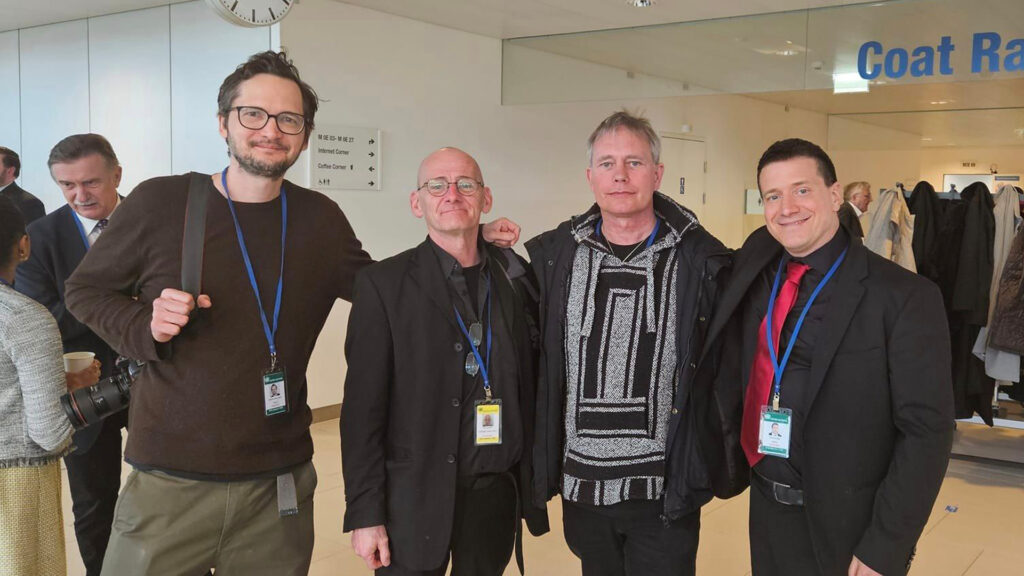
At CND, we meet activists and colleagues from drug user organizations from all over the world, who are passionate about the same topics and who have also been criminalized and subjected to humiliation from the police and health services. And who also have to live with the same risks involved in having to buy substances from the illegal market.
Among the uplifting changes at this year’s CND was the strong presence of representatives of indigenous people. An important involvement that has become particularly relevant as a result of Bolivia’s initiation of a critical review of the coca leaf’s location within the international drug control system. This is currently undergoing a process by the World Health Organization’s Expert Committee on Drug Dependence (ECDD) and will end up in a vote at the CND later.
This year, Norway organised a side event titled Empowering global drug prevention through strengthening Systems: a review of the prevention system. There, among others, the Ministry of Health and Welfare’s Torbjørn Brekke, Norway’s ambassador to Austria, Susan Eckey, and Yvonne Larsen and Aleksander Hvaring from KORUS Oslo participated in the panel. They discussed how the review of prevention systems can be useful for further efforts for knowledge-based prevention at the national and global levels. The event was supported by Canada, Finland, Slovenia, Sweden, the World Health Organization, the UNODC, the Pompidou Group, and the EMCDDA.
At another event, we heard from the organisation Unjust in England a story about a dark-skinned 15-year-old girl with dreads who came to school and was accused of using cannabis. She was pulled out of class and reported to the police. They came and stripped her completely naked, and the police found nothing on her. In England, 8,200 such strip examinations are carried out each year, and 30 percent of those subjected to them are dark-skinned. To put it into perspective, in the 2011 census, 87.1 percent of the population in England considered themselves white, 6.9 percent Asian, 3.0 percent dark-skinned and 2 percent mixed.
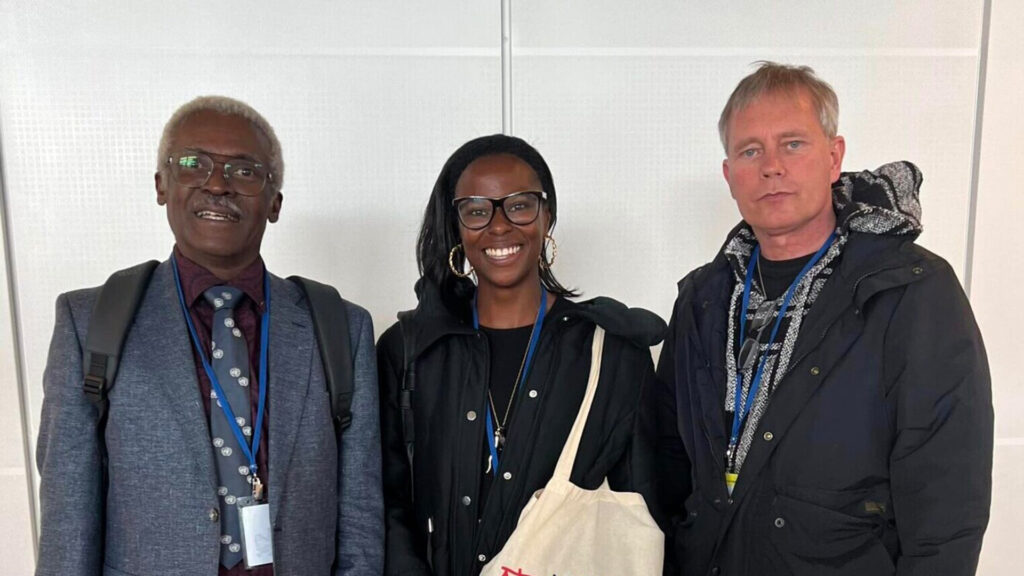
Some of those who come to CND come from countries with such high overdose rates that it is hard to comprehend. Our colleagues from USA, Canada and The United Kingdom say something important in that context. That it is the access to unregulated substances such as heroin, fentanyl and nitazine that is creating the overdose epidemic. In contrast, when these or other substances come in controlled and legal settings, they are still addictive; they can go astray, and people can die from overdose. However, that is not what leads to either the overdose epidemic, all injuries, all crimes, unevenly distributed human rights violations or overcrowded prisons.
On the other hand, this is about a demand that is not met by the authorities but is tentatively fought by them, with profoundly tragic consequences. There is much we recognise from other countries, such as that people from deprived areas have a several times higher risk of being criminalised than others. Internationally, it is particularly the poor and minorities who are hit the hardest – people with darker skins and indigenous people. We heard stories from Asia about sex workers who, when caught with one user dose, were dragged down to the police station, thrown into a cell, raped, beaten and shaved and how they never get opportunities for reintegration because of their criminal records.
It is heartbreaking to hear about all human rights violations that particularly affect vulnerable and already stigmatised groups and that are committed in the name of the drug war. Drug laws are also used by undemocratic leaders to suppress and clear oppositional journalists, lawyers and politicians. From all corners of the world, experience shows that the fight against producers, distributors, sellers and users of drugs does not affect access but increases unfortunate consequences.
At the same time, it is pleasing to see that an increasing number of countries and cities favour fundamental change. Norway is at a turning point in its drug policy but so is many other countries. We heard it during the negotiations and meetings, and we think we struck a chord in the discussion with our event: exploring legal regulation as a tool to promote human rights, health and security in Europe.
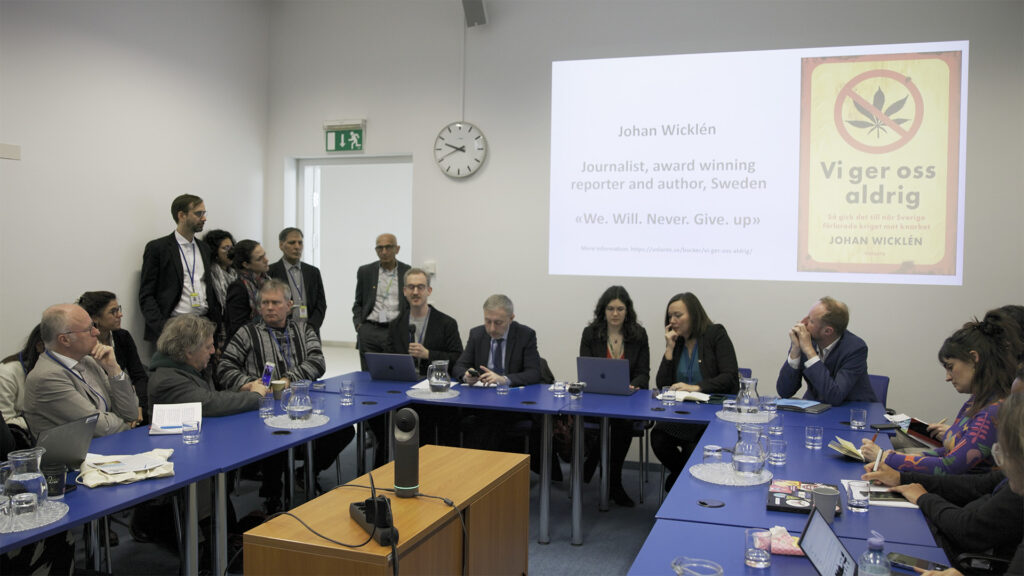
The current policy means that the authorities have no control over the market for drugs, they have no chance to regulate them, and all the money goes to criminal groups.
The development in the drug market means that organized criminal networks pose such a great danger to individuals, local communities, welfare systems and democracy that more and more people see that a thorough change is definitely needed.
Read also:
Ann Fordham and Jamie Bridge, IDPC: Harm reduction takes center stage as UN drug policy breaks free from the shackles of consensus
Péter Sárosi, Drugreporter: Breaking the taboo – Discussing Drug Regulation at the UN
Jamie Bridge, IDPC: CND67: A meeting full of milestones
March 14, 2023 we arranged the side event: «Ensuring Human Rights protection in Nordic drug policy» (YouTube) at the UN Commission on Narcotic Drugs, in Vienna.
This side event aimed to discuss the Nordic drug policy discourse: Is policing a proportional response and the best option to adress drug use? Are strict and punitive control regimes in Health Services for People Who Use Drugs cost effective and helping? Are they aligned with the goal of ensuring healthy lives and well-beeing for all? How are Human Rights protected in the midst of these questions?
The event aimed to highlight the findings of recent research on Human Rights in Nordic countries.
The event was organised by The Association for Humane Drug Policy with the support of Iceland, Norway, Denmark, IDPC and RIO.
Speakers:
Eivind Digranes, Norwegian National Human Rights Institution
Halldóra Mogensen, MP, Iceland
Nanna W. Gotfredsen, Street Lawyer and MP, Denmark
Arild Knutsen, head of The Norwegian Association for Humane Drug Policy (FHN)
Moderated by: Marie Nougier, International Drug Policy Consortium (IDPC)
Side event organizer: John Melhus, The Norwegian Association for Humane Drug Policy
The event was recorded and uploaded to YouTube. You can see the event here. Video produced by Istvan Gabor Takacs / Drugreporter https://drogriporter.hu/en/
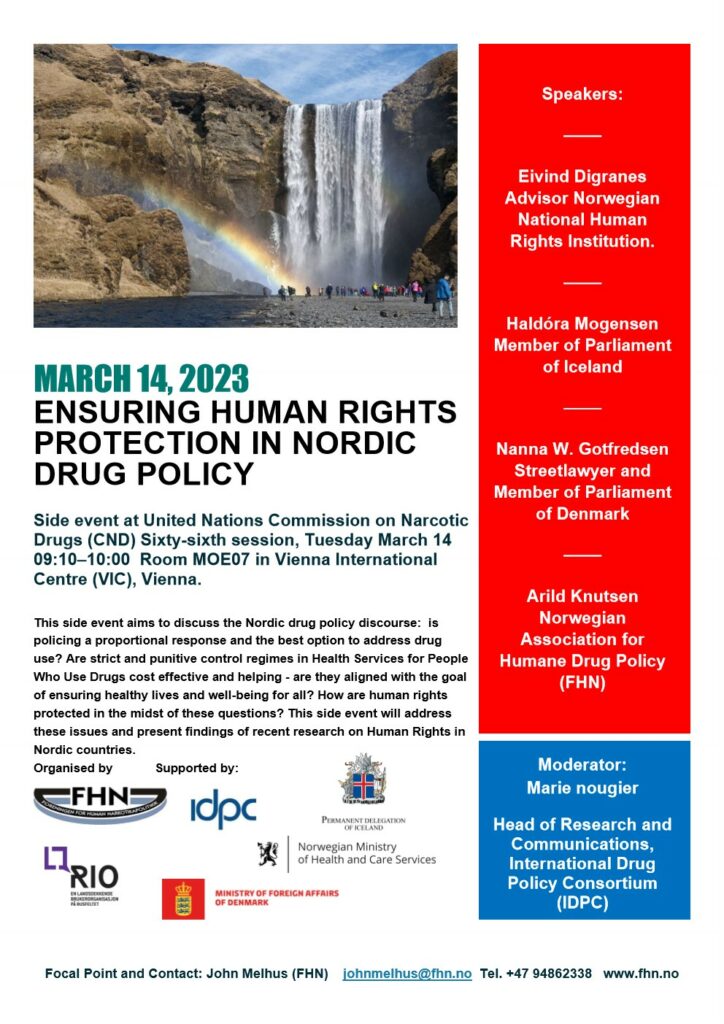
This was Arild Knutsens talk at the event:
I am glad to say that in the context of human rights in Nordic drug policy, Norway is still heading in the right direction and now faster than ever before. Even though; the report from The Norwegian National Human Rights Institution clearly shows that even a country that prides itself on being a Human Rights champion, has room for improvement. I think it is a strength for any country to be able to have itself scrutinized on Human Rights, and I hope more institutes on Human Rights in other countries will follow this example.
As some of you might remember, a conservative Norwegian government suggested a drug policy reform, with decriminalization, in 2021. It was to advance social justice and human rights. And please remember that decriminalization of drug use is strongly supported by the entire United Nations system through the “UN common position on drugs”.
The Norwegian society was still not ready for it, so the parliament turned the suggestion down, but the discussion is still going strong and there has happened so much in the aftermath of this, that it is really amazing.
1. The courts first started to reduce penalties in drug cases, changing sentences from months in prison to a few weeks suspended sentence.
2. The Supreme Court then decided that those with substance use disorders shall no longer receive punishment for their own personal use. Personal use allows for 5 grams of heroin, amphetamine or cocaine, and for cannabis the limit is set to 15 grams.
3. In one tried case even a recreational user was let off with probation for 10 grams of amphetamine, due to “personal circumstances”
So I must say that the Norwegian society has really started taking considerations to the wellbeing of the people to whom this applies, rather than blindly punishing them for the sake of the society. In some ways the court system is now leading us to a even more humane drug policy than the previous government suggested.
4. The Attorney General has since instructed the police that if a person suspected to be in possession of drugs for their own use is addicted to drugs, this person should no longer be stopped, searched, or arrested. If they are in doubt as to whether the person is addicted to drugs, then the benefit of the doubt must be given to that person.
There has been a historic drop in reported drug offenses after this, and it seems as if the police now have reduced, if not stopped their search and strip - practice as well as their bringing people in for drug testing to see if they are under the influence.
During this extensive development, The current government is planning a new drug reform that they call a “Prevention and treatment reform”, but one issue that the current government really seems to take into consideration is proportionality. What is a proportional reaction? And this is a key issue, but at the same time we are seeing some troubling signals from some of our neighboring areas, where the police response to drug use is being scaled up, sentencing is becoming harsher and there’s also a political rhetoric blaming users for the violence and even terrorism that is happening due to drug crime. We have seen this political abdication of responsibility many times before throughout history and we do know the results:
More stigma, more damage and less positive health outcomes. We hope that this will end. Because there are alternatives!
And I think that the development in Norway can be of inspiration for us all, and maybe especially for the Nordic countries.
Because, seeing that the police now have stopped, at least reduced, their following and arresting people for suspicion of drug influence or possession, we have a unique possibility to find other ways to meet and react to drug use.
In the lead up to the decriminalization reform, a Norwegian committee did extensive research for a year and found that criminalizing drug use does not prevent drug use. It just creates problems, it is actively counterproductive. And that was very surprising to many people.
Now, I think what we owe each other is extensive research on whether the police should prioritize drug use. Because, since the police have taken two steps back, it has opened for social workers to take those two steps forward. They have the right expertise, the right tools and then the police can prioritize serious crime, even such crime that traumatizes people and creates the kind of trouble a lot of people use drugs to be able to bear.
Also, during the year that the police have taken two steps back, they have seized a larger quantity of drugs than in many many years. Actually they have increased the amount of seizures to almost twice the average for the last decade.
It is also time to acknowledge that drug users have a particular vulnerability to being exposed to crime and that they must be protected.
The police should change practice from criminalization to behavior regulation.
They should ensure that drug users are just as protected from crime as everyone else. We want drug users to have the same protection of the law that everyone else can take for granted.
A couple of weeks back, a local police officer said to me “You know, I think there are other professions that can do drug prevention work much better than us in the Police”
And I think he is very right!
When we look into what the authorities have taken into account, what The Norwegian National Human Rights Institution has taken into consideration and what the discussions mainly is about, it is about the follow-up after arrest. But why arrest someone for drug use at all? What we are missing is a concrete discussion about police work and priorities. In all stories about oppression and human rights violations throughout history, police control instead of police protection is at the center of these stories. We therefore think it is wrong to talk about de-stigmatization and human rights violations without this perspective.
Here you can read and watch a video from last years event "Exploring the status of Nordic models of criminalization and decriminalization of drug use – which consequences these processes have had and how changes in direction have challenged the perspectives of politicians, society and the general public at large"
Alle fortjener et godt liv, alle burde ha rett til behandling, men i Norge har en bare rett til vurdering om behandling.
I fjor deltok tusenvis av mennesker i 205 byer i 93 land for å kreve bedre narkotikapolitikk forankret i folkehelse og menneskerettighetene.
Vi er på god vei til å slå fjorårets rekord, så bli med å vis din støtte på FNs internasjonale dag mot rusmisbruk og narkotikasmugling.
For ditt bidrag vil ikke bare være med på å sette en ny rekord, men det vil også være med på å gi et håp for de familiene som lider grunnet rusavhengighet.
Hvordan du kan bidra:
Husk at uansett hvor du befinner deg så kan du bidra ved å tagge bildene med: #supportdontpunish og #fhn_ngo
Vi i Foreningen for human narkotikapolitikk Hordaland og proLARNETT håper du tar deg tid til å støtte denne internasjonale markeringen, og besøk gjerne Support Don't Punish nettsiden for mer informasjon eller for å se de tusenvis av bildene som allerede er blitt publisert.
PS: 26. Juni er en årlig markering, men du kan også vise din støtte alle andre dager året rundt 24/7.
Foreningen for human narkotikapolitikk i samarbeid med proLARNETT vil avholde en markering på Verdens narkotika dag (26 juni) i Oslo ved Stortinget.